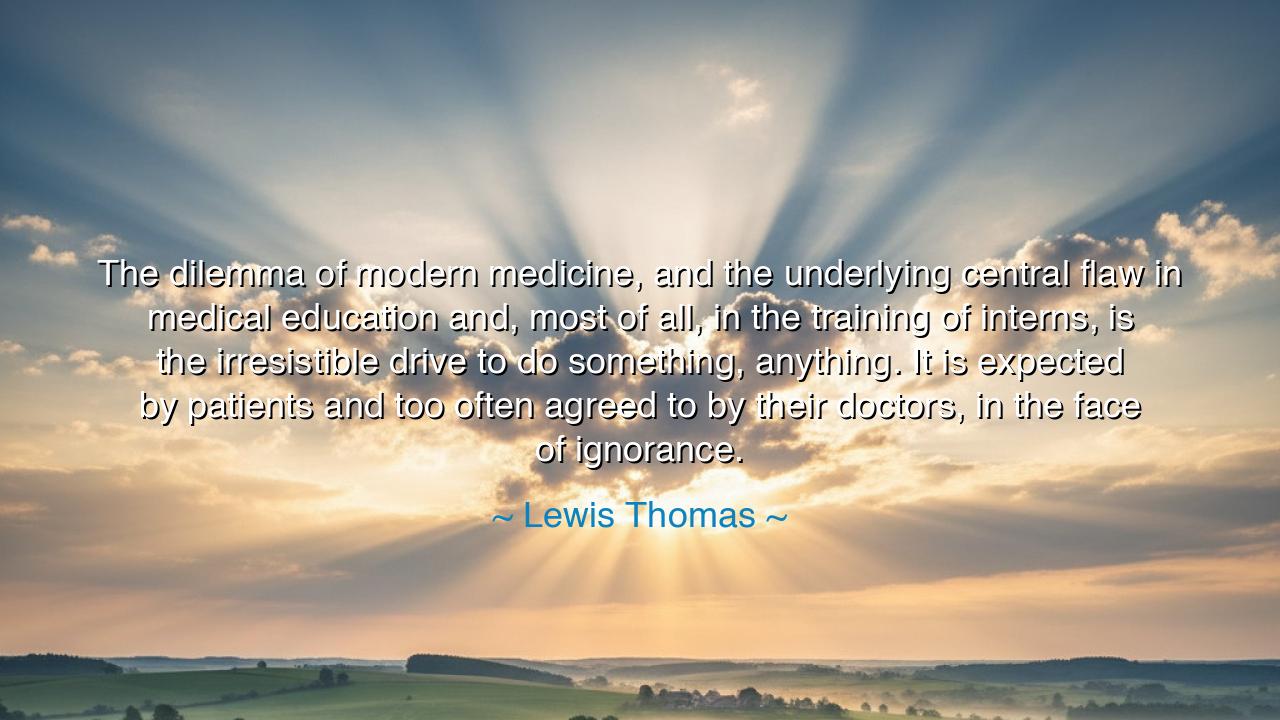
The dilemma of modern medicine, and the underlying central flaw
The dilemma of modern medicine, and the underlying central flaw in medical education and, most of all, in the training of interns, is the irresistible drive to do something, anything. It is expected by patients and too often agreed to by their doctors, in the face of ignorance.






The physician-philosopher Lewis Thomas, in his profound reflection on the nature of healing, wrote these words of warning and wisdom: “The dilemma of modern medicine, and the underlying central flaw in medical education and, most of all, in the training of interns, is the irresistible drive to do something, anything. It is expected by patients and too often agreed to by their doctors, in the face of ignorance.” In this lament, Thomas touches upon the eternal tension between action and understanding, between the humility of wisdom and the arrogance of haste. His words are not a rejection of medicine, but a reminder that the greatest healing often begins with restraint, with patience, and with the courage to admit what one does not yet know.
In ancient times, the physician was not merely a mechanic of the body but a philosopher of life. The Greek healer Hippocrates, whose name still blesses the oath of every doctor, taught that medicine is bound to nature’s rhythm, that healing requires time, and that sometimes the greatest skill of the healer is to “do no harm.” Yet, as knowledge and technology advanced, this humility was slowly overshadowed by the drive to act, to intervene, to fix. The dilemma of modern medicine is that it possesses immense power but often lacks the patience of wisdom. When the unknown appears, many rush to act—not because they know what to do, but because they fear the silence of inaction.
Lewis Thomas, who was both a physician and a poet of science, saw this flaw not only in hospitals but in the very structure of medical education. Young interns, filled with zeal and newly forged knowledge, are taught to equate action with success, intervention with care. They are rarely taught the sacred art of waiting—the discipline of observation, the humility to say, “I do not yet understand.” And thus, the hospitals of the world become theaters of motion—needles, scans, prescriptions, surgeries—all performed under the unspoken fear that stillness might be mistaken for ignorance.
But true wisdom, Thomas reminds us, lies not in constant doing, but in discernment. To act blindly is to gamble with life; to pause and reflect is to honor it. The physician who dares to stand before a mystery without rushing to conquer it is not weak—he is noble. For in that silence, truth has space to speak. Consider the great Dr. Ignaz Semmelweis, who in the 19th century observed that doctors who washed their hands between autopsies and childbirth saved more lives than those who did not. His insight, born not from impulsive action but from careful observation, saved countless mothers from death. Yet he was scorned in his time by those too eager to act, too proud to listen to evidence.
And so it is, even beyond medicine, that the drive to do something—anything—leads humanity astray. Leaders launch wars to silence uncertainty. Engineers build faster before they build safer. People rush to speak before they understand. The disease Thomas describes is not of medicine alone; it is of the human spirit itself—the fear of stillness, the discomfort with mystery. But just as the body needs rest to heal, so too does the mind need stillness to know.
The lesson is clear: Wisdom requires humility. The doctor must learn to wait as much as to work, to listen as much as to diagnose. The teacher, the leader, the parent—all must learn that not every problem is solved by immediate action. In a world that prizes speed, slowness becomes an act of courage. To pause, to reflect, to say, “I do not yet know”—this is the beginning of true understanding. For ignorance acknowledged is not weakness; it is the fertile soil from which knowledge blooms.
Therefore, let this be the teaching for our time: In the face of uncertainty, do not rush blindly into the storm. Whether you are a healer of bodies, of hearts, or of nations—learn first to see before you do. Let patience be your instrument and humility your guide. When the urge to act overwhelms you, remember the wisdom of Lewis Thomas—that the most dangerous cure is often born from fear, and the truest healing from understanding.
For sometimes the greatest act of healing, the most profound form of wisdom, is simply this: to wait, to listen, and to let life itself reveal its way. Only then does medicine, and indeed humanity, fulfill its highest purpose—not to control existence, but to live in harmony with its mysteries.






AAdministratorAdministrator
Welcome, honored guests. Please leave a comment, we will respond soon